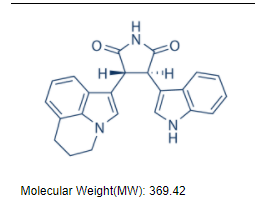| 1.Inquiries will be replied within 24 hours |
| 2.We could supply various packages as you required |
| 3.To protect the profit of our agents, price will not show on website, please send inquiries to get the price. |
| 4.Fast delivery, goods arrive your office within 3 to 5 days |
| 5.Please click "Inquiry" or "Email" below to get the price |
|
|
|
|
|
|
|
C23H19N3O2 |
|
|
|
|
369.42 |
|
in stock |
|
|
905854-02-6 |
|
98%+ |
Introduction
ARQ-197 has been shown to prevent HGF/c-met induced cellular responses in vitro. ARQ-197 possesses antitumor activity; inhibiting proliferation of A549, DBTRG and NCI-H441 cells with IC50 of 0.38, 0.45, 0.29 μM. Treatment with ARQ-197 results in a decrease in phosphorylation of the MAPK signaling cascade and prevention of invasion and migration. In addition, ectopic expression of c-Met in NCI-H661, a cell line having no endogenous expression of c-Met, causes it to acquire an invasive phenotype that is also suppressed by ARQ-197. Although the addition of increasing concentrations of ARQ-197 does not significantly affect the Km of ATP, exposure of c-Met to 0.5 μM ARQ-197 decreased the Vmax of c-Met by approximately 3-fold. The ability of ARQ-197 to decrease the Vmax without affecting the Km of ATP confirmed that ARQ-197 inhibits c-Met through a non–ATP-competitive mechanism and may therefore account for its high degree of kinase selectivity. ARQ-197 prevents human recombinant c-Met with a calculated inhibitory constant Ki of approximately 355 nM. Although the highest concentration of ATP used is 200 μM, the potency of ARQ-197 against c-Met is not reduced by using concentrations of ATP up to 1 mM. ARQ-197 blocks c-Met phosphorylation and downstream c-Met signaling pathways. ARQ-197 suppresses constitutive and ligand-mediated c-Met autophosphorylation and, by extension, c-Met activity, in turn leading to the inhibition of downstream c-Met effectors. ARQ-197 induction of caspase-dependent apoptosis is increased in c-Met–expressing human cancer cells including HT29, MKN-45, and MDA-MB-231 cells.
All three xenograft models treated with ARQ-197 display reductions in tumor growth: 66% in the HT29 model, 45% in the MKN-45 model, and 79% in the MDA-MB-231 model. In these xenograft studies, no significant body weight changes following oral administration of ARQ-197 at 200 mg/kg are observed. Pharmacodynamically, the phosphorylation of c-Met in human colon xenograft tumors (HT29) is strongly inhibited by ARQ-197, as assessed by a dramatic reduction of c-Met autophosphorylation 24 hours after a single oral dose of 200 mg/kg of ARQ-197. This same dosage in mice exhibits that tumor xenografts are exposed to sustained plasma levels of ARQ-197, consistent with the observed pharmacodynamic inhibition of c-Met phosphorylation and inhibition of proliferation of c-Met harboring cancer cell lines. Plasma levels of ARQ-197 10 hours after dosing are determined to be 1.3 μM, more than 3-fold above the biochemical inhibitory constant of ARQ-197 for c-Met. Therefore, ARQ-197 is able to suppress its target in vivo in the xenografted human tumor tissue. In conclusion, ARQ-197 inhibits the growth of c-Met-dependent xenografted human tumors.
Products for scientific research use only







